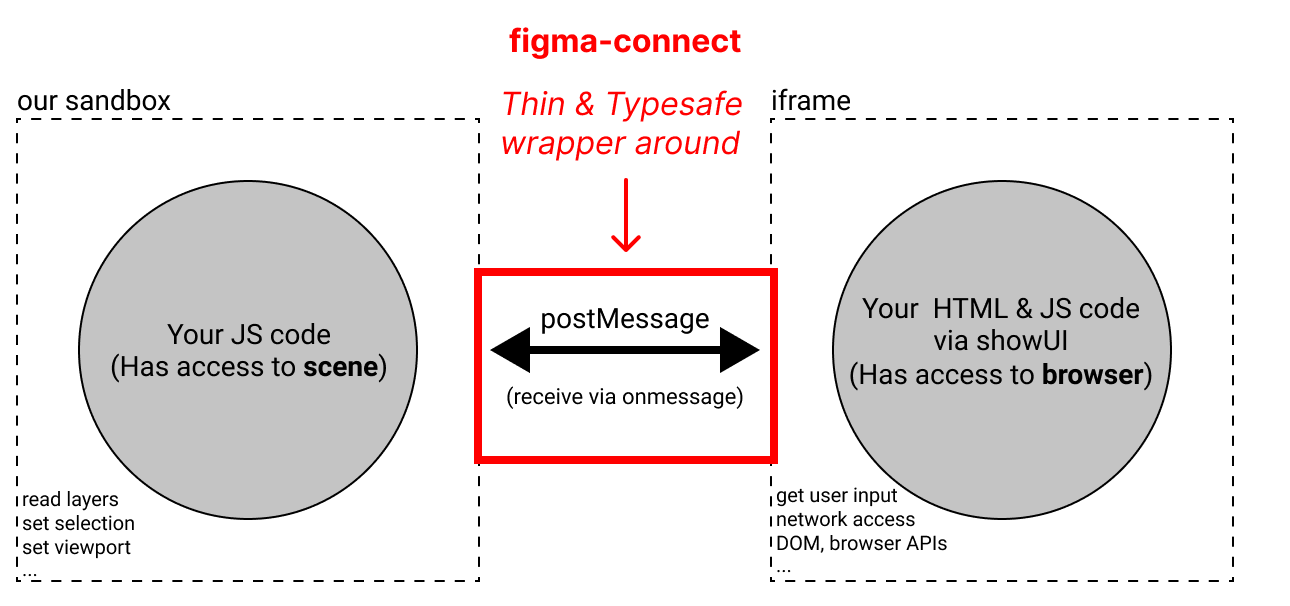Status: Experimental
figma-connect is a straightforward and typesafe wrapper around the communication between the app/ui (iframe) and plugin (sandbox) part of a Figma Plugin.
Create a typesafe and straightforward wrapper around the communication between the app/ui and plugin part of a Figma Plugin.
Define types for events to be shared between the Figma app and plugin.
shared.ts
import { type TFromAppMessageEvent } from 'figma-connect/app';
import { type TFromPluginMessageEvent } from 'figma-connect/plugin';
// Plugin Events (Plugin -> App)
interface TOnSelectNodeEvent extends TFromPluginMessageEvent {
key: 'on-select-node';
args: { selected: Pick<SceneNode, 'name' | 'id'>[] };
}
interface TOnDeselectNodeEvent extends TFromPluginMessageEvent {
key: 'on-deselect-node';
args: { deselected: Pick<SceneNode, 'name' | 'id'>[] };
}
type TFromPluginMessageEvents = TOnSelectNodeEvent | TOnDeselectNodeEvent;
// App Events (App -> Plugin)
interface TOnUIRouteChangeEvent extends TFromAppMessageEvent {
key: 'on-ui-route-change';
args: {
activeRoute: 'a' | 'b' | 'c';
};
}
interface TOnUserLoginEvent extends TFromAppMessageEvent {
key: 'on-user-login';
args: {
userId: string;
timestamp: number;
};
}
type TFromAppMessageEvents = TOnUIRouteChangeEvent | TOnUserLoginEvent;Initialize and handle events in the app/ui (iframe) part.
app.ts
import { FigmaAppHandler } from 'figma-connect/app';
import { TFromAppMessageEvents, TFromPluginMessageEvents } from './shared';
// Create App Handler and pass global 'parent' instance as first argument
const appHandler = new FigmaAppHandler<TFromPluginMessageEvents, TFromAppMessageEvents>(parent);
// Send Events to the 'plugin' part
appHandler.post('on-ui-route-change', { activeRoute: 'a' });
appHandler.post('on-user-login', { userId: 'user123', timestamp: Date.now() });
// Register callbacks to receive Events from the 'plugin' part
appHandler.register({
key: 'on-select-node',
type: 'plugin.message',
callback: async (_, args) => {
console.log('Selected Nodes:', args.selected);
}
});
appHandler.register({
key: 'on-deselect-node',
type: 'plugin.message',
callback: async (_, args) => {
console.log('Deselected Nodes:', args.deselected);
}
});Initialize and handle events in the plugin (sandbox) part.
plugin.ts
import { FigmaPluginHandler } from 'figma-connect/plugin';
import { TFromAppMessageEvents, TFromPluginMessageEvents } from './shared';
// Create Plugin Handler and pass global 'figma' instance as first argument
const pluginHandler = new FigmaPluginHandler<TFromAppMessageEvents, TFromPluginMessageEvents>(
figma
);
// Send Events to the 'app/ui' part
pluginHandler.post('on-select-node', { selected: [{ id: '1v1', name: 'Frame1' }] });
pluginHandler.post('on-deselect-node', { deselected: [{ id: '1v1', name: 'Frame1' }] });
// Register callbacks to receive Events from the 'app/ui' part
pluginHandler.register({
key: 'on-ui-route-change',
type: 'app.message',
callback: async (_, args) => {
console.log('UI Route Changed:', args.activeRoute);
}
});
pluginHandler.register({
key: 'on-user-login',
type: 'app.message',
callback: async (_, args) => {
console.log('User Logged In:', args.userId, 'at', args.timestamp);
}
});To use figma-connect in a ReactJS application, you can utilize the useAppCallback() hook to handle events from the plugin part in a React component.
import React, { useState } from 'react';
import { appHandler } from './app';
import { useAppCallback } from './hooks';
import { TFromAppMessageEvents, TFromPluginMessageEvents } from './shared';
export const MyComponent: React.FC = () => {
const [selectedNodes, setSelectedNodes] = useState([]);
useAppCallback(
appHandler,
{
type: 'plugin.message',
key: 'on-select-node',
callback: async (_, args) => {
console.log('Selected Nodes:', args.selected);
setSelectedNodes(args.selected);
}
},
[]
);
return (
<div>
<h1>Selected Nodes</h1>
<ul>
{selectedNodes.map((node, index) => (
<li key={index}>{node.name}</li>
))}
</ul>
</div>
);
};


